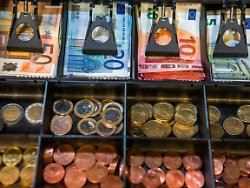Tuesday June 22, 2021
Economic recovery expected
Lower tax revenues than before the crisis
The custodians of the public coffers posted a healthy revenue increase in May as well. However, tax revenue is still lower than it was before the crisis. For the coming months, however, there is increasing evidence of a noticeable economic upturn – and with it a further increase in income.
German tax revenues rose by a good fifth in May against the backdrop of a corona-related weak previous year. Compared to May 2019 – i.e. the corresponding month in the pre-crisis year – tax revenues were 4.6 percent lower, according to the monthly report of the Federal Ministry of Finance. In April 2021, against the background of a corona-related significantly lower revenue in the same month of the previous year, tax revenues had shot up by almost a third.
In May, the federal government posted a total of 29.1 percent more tax revenue and achieved a revenue of 20.6 billion euros. With 23.4 billion euros, the federal states received 20.4 percent more taxes. In total, the tax revenue in May amounted to around 50 billion euros. In the first five months, revenues increased by 4.2 percent to 273.4 billion euros. The federal government posted a slight minus, while the federal states had more in their coffers.
The shortage of important intermediate products is slowing the economy
With regard to further economic development, the ministry’s economists said that the indicators “now point to an increase in macroeconomic activity in the second quarter” after the economy started the year with a decline in performance due to the pandemic. In the industrial sector, the continuing shortage of important intermediate products is likely to have had a slowing effect in April.
Export expectations, incoming orders and the business climate indicated further growth in the industry, emphasized the Ministry of Finance. In the economic sectors particularly affected by the pandemic, the mood brightened noticeably in view of the significantly lower number of infections in May. The retail sector is more optimistic about the future and has reduced short-time working.
All of this is increasingly having an impact on the labor market, it said. “In addition to the overall decline in short-time work, unemployment also fell,” emphasized the economic experts. With regard to inflation, it was said that special and base effects would also make an increasingly weaker contribution in the next few months, but nevertheless noticeably contribute to inflation. However, inflation will be temporarily higher in the second half of the year, as VAT was lowered in the comparable period in order to stabilize consumption.
.
